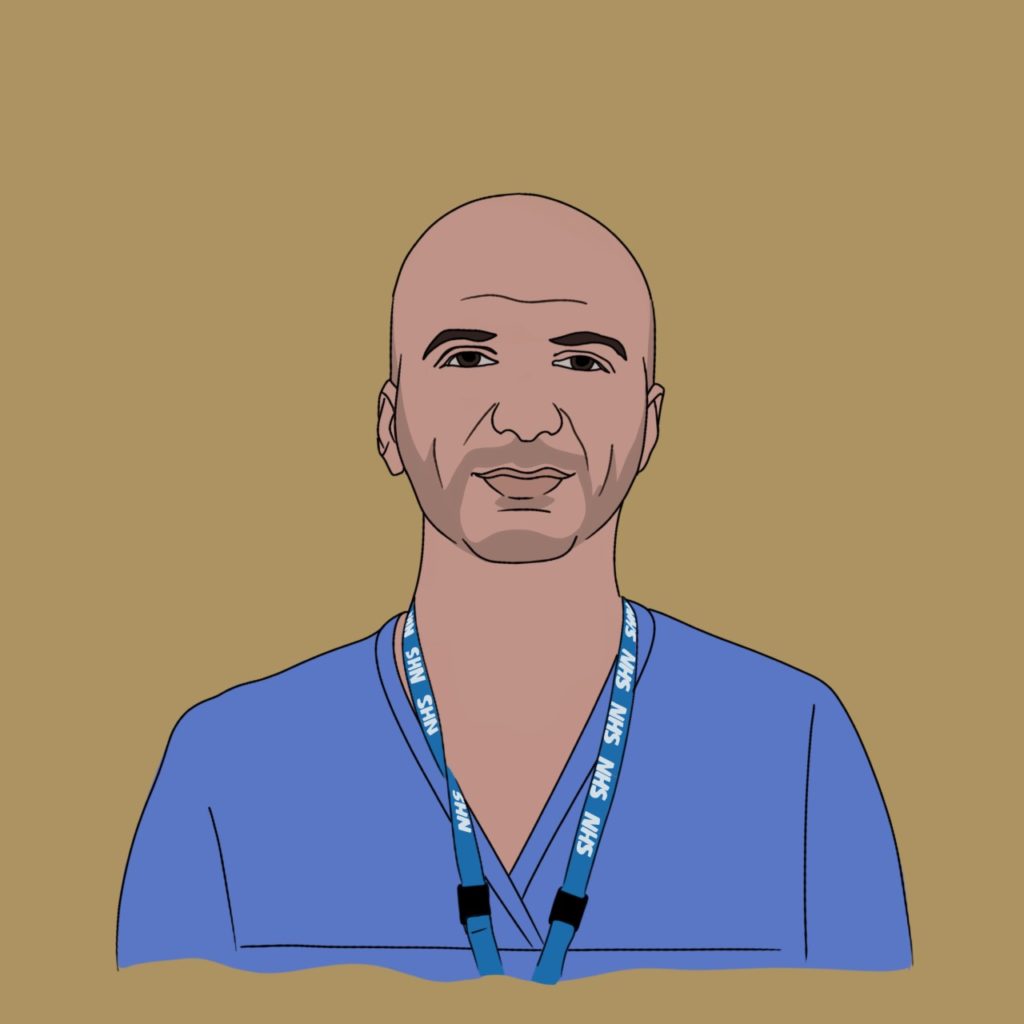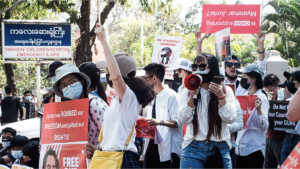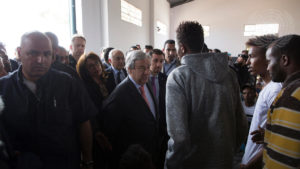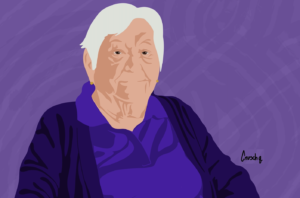UAI recently conducted an interview with Hassan Akkad, a young English language teacher and photographer, who fled Syria and arrived in England in 2015, where he is now a refugee. An award-winning film-maker, Hassan volunteered to work as a cleaner in a London hospital as the coronavirus pandemic stretched the health care system. Hassan made headlines last month when his video appeal to UK Premier, Boris Johnson, succeeded in convincing the government to reverse a decision that excluded family members of health care staff engaged in essential frontline (but low-paid) work from a bereavement scheme available to other migrant health care personnel.
United Against InHumanity (UAI): Thank you for taking time out from your busy schedule and before discussing your current role, I am interested in knowing more about your experience as a refugee in the UK.
Hassan Akkad (HA): Thank you, great to speak with you. I arrived in the UK in late 2015, nearly five years ago now. Living in exile is not easy for anyone. Then following arrival, navigating a new system while dealing with so many unfamiliar things can be daunting. The postal system, the Home Office bureaucracy, cultural barriers, accessing employment – all were very difficult despite being able to speak English fluently. Then following my arrival to the UK, Britain decided to leave the EU. The rise in anti-migrant and anti-refugee rhetoric was very evident, as Britain very publicly argued about the kind of country it wanted to be. It added another layer of pressure, because that started to make me feel unwelcome.
UAI: Many of your co-workers are not British nationals and, like you Hassan, are doing work that is vital for the safety and survival of people who have tested positive for Covid-19 (C-19) or are in danger of being infected. Can you please provide us with a brief overview of the situation of National Health Service (NHS) staff dealing with the pandemic?
HA: I joined the NHS two and a half months ago, during the peak of the pandemic. When I arrived, all my colleagues in the ward were putting in extra hours to combat this pandemic. It was a hugely challenging time for them all – professionally, emotionally, physically. For a long time we didn’t have a single empty bed in our Covid-19 ward. We always had patients. Covid-19 patients who have been hospitalised tend to be very sick, needing round the clock care. It was very intense. I have huge admiration for the work ethic and dedication of my colleagues on the ward – they come from all over the world, however they came together as a team, united in their mission to beat the virus. It’s only in the past week or two that most of us have had a chance to slow down and take some time off, and see our families. It’s very needed – the work was physically, emotionally exhausting and after these events it’s crucial to have time to slow down and process what you’ve just experienced. So many of us were running purely on adrenaline.
UAI: Could you please explain your campaign based, amongst others, on Twitter to secure equitable access to social safety and health care support for all staff keeping the NHS going irrespective of their nationality, ethnic background or place of origin?
HA: Of course. It wasn’t exactly a planned campaign – as you can see in my video, I was very emotional.
It was more of a knee jerk reaction to what felt like the government spitting in the face of my colleagues, and a demonstration that all of their promises of ‘protecting key workers’ really were just empty words. Words won’t protect us from the virus; PPE will. Words won’t protect our partners’ immigration status when we pass away; changes in policy will. I was walking into the hospital when I read the Independent article highlighting that the bereavement scheme would only apply to doctors and nurses; the work of NHS support staff clearly didn’t make the cut. This wasn’t a theoretical protection – every day we see on the news that more frontline health workers have died from Covid. There was a very real sense that, by going to work, we were risking our lives and those of our families. That’s not an easy decision to make. I felt powerless – I had a Twitter account with a moderate platform (9K followers), so I filmed a video in my car, to Prime Minister Boris Johnson, making a plea for him to change his mind. It clearly touched the mood of the public, because it quickly reached 5M views. That evening, the government U-turned on that policy. It was a really positive moment – however we need to keep it in perspective. There is still a lot more work to do.
UAI: Congratulations on your critical role in the reversal of the troubling and discriminatory UK Government Immigration Health Surcharge policy. Has this development, debated in Parliament and elsewhere, helped the wider British public understand the role of refugees and other migrants in maintaining essential services, in general, and their crucial role during the pandemic? Will it impact favourably, do you think, on anti-migrant sentiments? Are there insights, as well as inspiration, in this policy reversal for others concerned with challenging the many problems and indignities faced by asylum seekers and other migrants in the UK and elsewhere?
HA: I think language is very important. Before the pandemic, as Britain discussed its role leaving the EU, the phrase ‘low-skilled’ workers was thrown around a lot. Suddenly, within a matter of weeks, those very same workers were being described as ‘key’. The public would come out onto their doorsteps every Thursday evening to clap for them. Stacking shelves, cleaning pavements, delivering packages, cleaning toilets – these are the low-paid, invisible jobs that keep the world moving, and they are disproportionately done by immigrant workers.
My friends at the organisation ‘Choose Love’ recently summarised it perfectly. They said, “while the hard work and sacrifices many migrant workers are making on the frontline of this crisis should be recognised and remembered, no one should have to risk their lives in order to be recognised as a human being. A person’s ‘usefulness’ should not define their worth. We should recognise and respect our common humanity, regardless of immigration status. Not just in a crisis, but all the time.” There is no overnight solution to the injustices and inequalities faced by immigrants and refugees in the UK – but I feel optimistic that if this momentum and pressure is maintained by the general public, this has the potential to be a turning point.
UAI: Many in the media and political circles say that C-19 is “the great equaliser” or that “we-are-all-in-this-together”. However, for people trapped in, or fleeing from, war zones – Syria, South Sudan, Yemen, or Afghanistan, to name just a few – the problems they face are of a different nature to self-isolating in London, Dublin, Berlin or the many small towns in countries with long-standing health care systems not battered by bombing raids.
You are busy in Whipps Cross hospital and know of the dangers posed by C-19 and we have all seen different examples of solidarity from food deliveries to help with home schooling. But do you see a particular role that individuals, civil society groups, and governments can play in reducing or eliminating the threats posed by this deadly virus and its consequences for vulnerable groups?
HA: The pandemic is not levelling the playing field – it is exposing in greater detail the vast inequalities, divides and injustices, on a local and international level, and making them worse. All of these things will impact your experience of the pandemic on a short, medium and long-term basis.
In Britain, for example, those who live with multiple people, who are manual labourers who can’t work from home and have members of the household going outside every day, who might live in a tower block, will have a much higher risk of contracting the virus. If you get the virus, you are more likely to die from it if you are black or ethnic minority – these people are over-represented in coronavirus-hospital-fatality statistics so far. Looking forward to the future, it’s widely predicted now that we are about to head into a period of unprecedented global recession, estimated to be three times the size of the 2008 financial crash. This is going to cause a steep rise in poverty and unemployment. Those with secure jobs or savings will hopefully be able to stay afloat – those without are going to struggle immensely.
Conflict-affected areas will be some of the worst to suffer in this situation – the International Crisis Group has cited Yemen and Northern Syria as being some of the most at risk, due to the infrastructure that has been destroyed after years of conflict and blockade. Both have recently seen their first confirmed cases of coronavirus. There are currently over 320 camps in northern Idlib (and northern Aleppo) up to the Turkish border, which are overcrowded and lacking in medical care and basic infrastructure, leaving their residents extremely susceptible to coronavirus. I worry about what will happen if the virus reaches these camps.
Often, when it comes to scary things that feel out of our control, we want to turn away. But for these people, this is their reality, they can’t turn away. And we are not powerless to help them. While the virus is showing us some terrifying things, it’s also shown us how interconnected we are, and how willing we all are to change our lives and routines for the good of the community – mutual aid groups that have sprung up around the country, people 3D printing visors in their garages, sewing scrubs for their local hospitals, sending out food parcels. The community response is amazing, and grassroots organisations have done an incredible job of filling the gaps left by the government.
We are all global citizens, and the place to start is in our own communities, identifying and looking out for the most vulnerable. The after-effects of this experience are going to be felt for a long time. Protecting each other has never been more important.
UAI: Thank you Hassan for your time. Thank you, equally, for your thoughtful and inspiring observations on what is possible when we prioritise action that is in the best interest of our shared humanity and those who are most at risk in this time of crisis.
Interview conducted in June 2020
Illustration of Hassan by Yemeni artist ©Ahlam Almulaiki @ cnvschq












